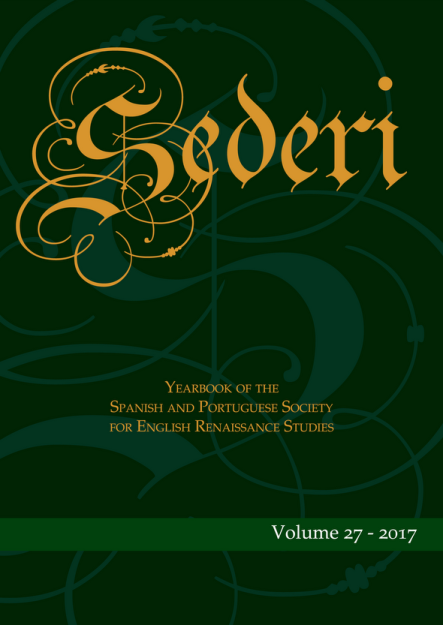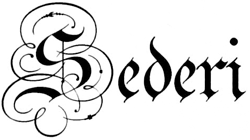
Sederi 27
Sederi 27 — 2017
EDITOR
Ana Sáez-Hidalgo
MANAGING EDITOR
Francisco J. Borge López
REVIEW EDITOR
María José Mora
ISSN 1135-7789
Ana María Hornero Corisco, “Translation of temporal dialects in the dubbed versions of Shakespeare films.” SEDERI 27 (2017): 47–79.
DOI: https://doi.org/10.34136/sederi.2017.3 Download PDF
Abstract
This paper intends to provide a thorough analysis of some linguistic features of Early Modern English present in three Shakespeare movies and how they have been transferred in the Spanish translation for dubbing. To achieve it, a close observation of forms of address, greetings and other archaic formulae regulated by the norms of decorum of the age has been carried out. The corpus used for the analysis: Hamlet (Olivier 1948) and Much Ado about Nothing (Branagh 1993), highly acclaimed and rated by the audience as two of the greatest Shakespeare movies. A more recent version of Hamlet (Branagh 1996)—the first unabridged theatrical film version of the play—will be analyzed too in the light of the translation choices, and the results will be compared with those of the other two films.
Keywords: Shakespeare; Hamlet; Much Ado about Nothing; audiovisual translation; literary films; temporal dialects.
References
Agost, Rosa. 1999. Traducción y doblaje: palabras, voces e imágenes. Barcelona: Ariel.
Algeo, John. 2010. The Origins and Development of the English Language. 6th ed. Boston: Wadsworth Cengage Learning.
Astrana Marín, Luis, trans. 1974. Obras completas de William Shakespeare. Madrid: Aguilar.
Blake, Norman F. 1996. A History of the English Language. London: Macmilan.
Brown, Robert, and Albert Gilman. 1989. “Politeness Theory and Shakespeare’s Four Major Tragedies.” In Language in Society, edited by Dell Hymes, 159–212. Cambridge: Cambridge University Press.
Burrow, J.A., and T. Turville-Petre. 1992. A Book of Middle English. Oxford: Blackwell.
Chaume, Frederic. 2012. Audiovisual Translation: Dubbing. Manchester: St. Jerome Publishing.
Corrie, Marilyn. 2006. “Middle English – Dialects and Diversity.” In The Oxford History of English, edited by Lynda Mugglestone, 86–119. Oxford: Oxford University Press.
Crystal, David, and Ben Crystal. 2002. Shakespeare’s Words. A Glossary and Language Companion. Penguin Random House. Accessed August 2017. http://www.shakespeareswords.com/.
Diccionario de la Real Academia de la Lengua Española. http://www.rae.es/recursos/diccionarios/drae.
Fontanella de Weinberg, Mª Beatriz. 2000. “Sistemas pronominales de tratamiento usados en el mundo hispánico.” In Gramática descriptiva de la lengua española, edited by Violeta Demonde and Ignacio Bosque, 1399–1425. Madrid: Espasa.
Frago Gracia, Juan Antonio. 2005. “El tratamiento personal en el Quijote. Del hecho sociolingüístico al recurso literario.” Boletín de la Real Academia Española 85 (291-292): 295–323.
Görlach, Manfred. 1991. Introduction to Early Modern English. Cambridge: Cambridge University Press.
Hatim, Basil, and Ian Mason 1990. Discourse and the Translator. Longman: London.
Hatim, Basil, and Ian Mason. 1997. The Translator as Communicator. London: Routledge.
Hornero Corisco, Ana María. 2006. “Marry, Hang Thee, Brock!: Linguistic Tools for Impoliteness in Shakespeare’s Works.” In Corpus Linguistics. Applications for the Study of English, edited by Ana Hornero, Mª José Luzón, and Silvia Murillo, 39–59. Bern: Peter Lang.
Hurtado Albir, Amparo. 2004. Traducción y traductología. Madrid: Cátedra.
Mason, Ian. 2001. “Coherence in Subtitling: The Negotiation of Face.” In La traducción en los medios audiovisuales, edited by Frederic Chaume and Rosa Agost, 19–31. Castellón de la Plana: Jaume I University.
Molina, Lucía, and Amparo Hurtado. 2002. “Translation Techniques Revisited: A Dynamic and Functionalist Approach.” Meta 47 (4): 498–512.
Moral, Pedro. 2016. “¿Por qué al público ya no le gusta el mejor guionista del mundo?” Cinemanía. El Mundo. Accessed September 2016. http://www.cinemania.es/noticias/por-que-al-publico-ya-no-le-gusta-el-mejor-guionista-del-mundo/.
Nevalainen, Terttu. 2006. “Mapping Change in Tudor English.” In The Oxford History of English, edited by Lynda Mugglestone, 178–211. Oxford: Oxford University Press.
Nevalainen, Terttu, and Helena Raumolin-Brunberg. 2003. Historical Sociolinguistics: Language Change in Tudor and Stuart England. London: Longman.
Nord, Christiane. 1997. Translating as a Purposeful Activity: Functionalist Approaches Explained. Manchester: St. Jerome Publishing.
Palander-Collin, Minna. 1997. “A Medieval Case of Grammaticalization, Methinks.” In Grammaticalization at Work: Studies of Long-Term Developments in English, edited by Matti Rissanen, Merja Kytö, and Kirsi Heikkonen, 371–404. Munchen: De Gruyter Mouton.
Wales, Katie. 1996. Personal Pronouns in Present-Day English. Cambridge: Cambridge University Press.
Weekley, Ernest. 1921. An Etymological Dictionary of Modern English. London: Murray.
Filmography
Hamlet. Directed by Laurence Olivier. 1948.
Hamlet. Directed by Kenneth Branagh. 1996.
Much Ado about Nothing. Directed by Kenneth Branagh. 1993.
